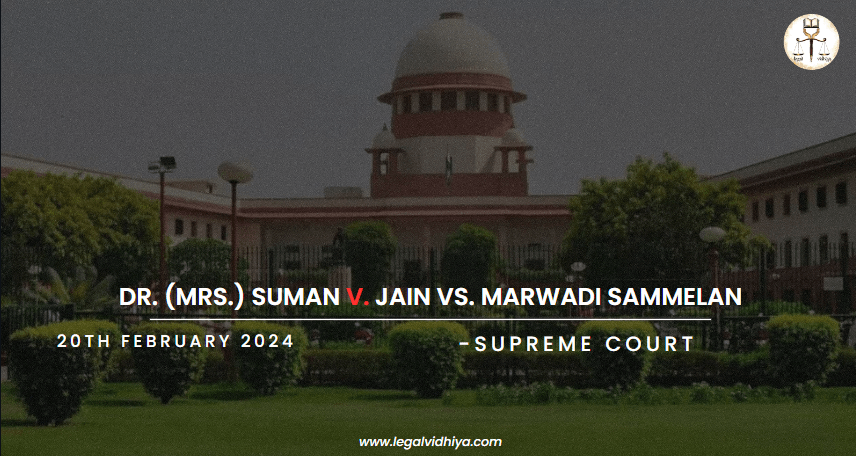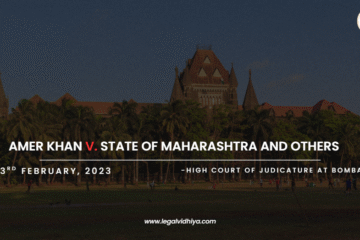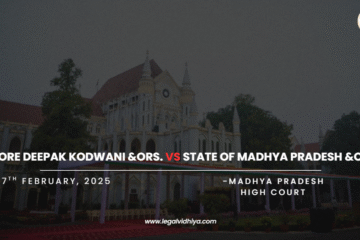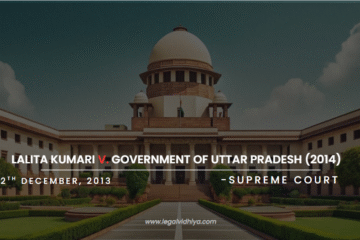
| CITATION | 2024 INSC 127 |
| DATE OF JUDGEMENT | 20th February 2024 |
| COURT | Supreme Court of India |
| APPEALLENT | Dr. (Mrs.) Suman V. Jain |
| RESPONDENT | Marwadi Sammelan |
| BENCH | J.K.Maheshwari, Sanjay Karol |
INTRODUCTION
The case of Dr. Mrs. Suman V. Jain vs Marwadi Sammelan through its Secretary revolves around the appellant’s resignation and her subsequent request for withdrawal of her prospective resignation prior to the effective date, and the rejection of her prayer for rejoining the duties. The appellant, Dr. Mrs. Suman V. Jain, was the Principal of B.M. Ruia Girls and G.D. Birla Girls College, run by the respondent No.1-Trust. The college is affiliated to the respondent No.2-University. The appellant was appointed as the Principal of the said College on 1-7-1992. Her appointment was subsequently approved by the University on a permanent basis. The appellant tendered her resignation on 25-3-2003, which was to take effect after the expiry of six months i.e., on 24-9-20032. However, she later requested the withdrawal of her prospective resignation prior to the effective date. The College Tribunal found that the appeal was not maintainable, but it delved into the question of withdrawal of the prospective resignation before the effective date on merits. After appreciating the facts, it was held in law that the prospective resignation can be withdrawn before the expiry of the intended date.
Facts
- Dr. Suman V. Jain was the Principal of B.M. Ruia Girls and G.D. Birla Girls College, run by the Marwadi Sammelan Trust.
- Due to deteriorating health and issues with the management of the Trust, Dr. Jain tendered her resignation on March 25, 2003, to take effect after six months, i.e., on September 24, 2003.
- However, Dr. Jain later sought to withdraw her resignation before its effective date. The Trust rejected her request for withdrawal.
- Dr. Jain challenged this rejection before the Mumbai University and College Tribunal, which dismissed her appeal. The Tribunal held that the appeal was not maintainable under Section 59(1) of the Maharashtra Universities Act, 1994.
- The Tribunal also held that while a prospective resignation can be withdrawn before its intended date, there was an implied understanding between Dr. Jain and the Trust prohibiting the withdrawal of the resignation.
- Dr. Jain then filed a writ petition in the High Court of Judicature at Bombay, which was dismissed by a single judge. The Division Bench of the High Court also dismissed her subsequent appeal.
ISSUES
- Whether in the facts of the case, the letter of the Management dated 08.04.2003 accepting the resignation was final, binding and irrevocable; and the rejection of the request for withdrawal of such resignation was in accordance with law?
- Whether in the facts of the case, what relief could be granted to the Appellant?
APPELLANT’S ARGUMENTS
The argument presented by the learned counsel for the appellant is centred on the legal principle that a prospective resignation can be withdrawn before it becomes effective, provided there is no specific provision to the contrary. This principle has been upheld in various judgments, including the case of “Union of India and Others Vs. Gopal Chand Misra and Others, (1978) 2 SCC 301,” which serves to distinguish it from the Rev. Oswald case. The council also pointed out the significance of the stay granted during the appeal process, which allowed the appellant to remain employed until reaching the age of superannuation. This aspect is crucial for the regularization of the employment period, which is sought to ensure that there are no gaps that could potentially affect the calculation of pension benefits. In the absence of a written contract or specific rules governing the service of the appellant, the counsel’s argument emphasizes the need to interpret the situation in a manner that would not disadvantage the appellant in terms of pension entitlements. The courts have recognized the importance of considering the entire service period, including the time between resignation acceptance and joining a new job, for the purpose of calculating pension benefits. It’s important to note that the legal framework surrounding resignation and pension benefits can be complex, and the outcomes of such cases often depend on the specific facts and circumstances, as well as the applicable laws and regulations.
RESPONDENTS ARGUMENTS
The legal counsel for the Trust argues that the resignation was final and binding, and that the appellant’s attempt to withdraw the resignation is not supported by the doctrine of “locus poenitentiae” because there was no timely objection to the resignation letter. Furthermore, they argue that the management’s acceptance of the resignation was to avoid a departmental inquiry, implying that the resignation was a strategic move by the appellant. On the other hand, the counsel for the Respondent Nos. 3 and 4 points out that the governing body of the management, as per the statutes of SNDT Women’s University, has the authority to accept resignations with six months’ notice or payment of salary, and that the government does not interfere in this process. The cases cited, such as “BSES Yamuna Power Limited Vs. Ghanshyam Chand Sharma and Others” and others, are used to support the argument that the appeal should be dismissed based on the precedents and findings of the College Tribunal, learned Single Judge, and the Division Bench. In legal disputes of this nature, the interpretation of statutes, contractual agreements, and precedents play a crucial role in determining the outcome. It’s essential to consider all the legal arguments and evidence presented to reach a fair and just decision. If you’re involved in this case or a similar legal matter, it would be advisable to consult with a legal professional who can provide guidance based on the specific details of the case.
ANALYSIS
- A resignation communicated as an intention to resign on a future date does not constitute an immediate and complete resignation. It is, in essence, a notice of intention to resign, which can be called a prospective or potential resignation.
- Such a resignation remains incomplete and inoperative until the specified future date arrives.
- The incumbent has the right to withdraw this prospective resignation at any point before it becomes effective, unless there are specific terms and conditions in the employment contract or office provisions that state otherwise.
- The Constitution Bench’s ruling emphasizes the importance of the effective date in determining the finality of a resignation. It provides clarity on the rights of an employee regarding the withdrawal of their resignation, ensuring that the resignation process is fair and respects the intentions of the individual. This principle protects employees from being bound by a decision that has not yet taken effect, allowing them the flexibility to reconsider their choice if circumstances change.
JUDGEMENT
The Hon’ble Supreme Court granted the appeal and overturned the decisions of the College Tribunal and the High Court, which had dismissed the appellant’s challenge to the rejection of her resignation. The court determined that the appellant’s resignation was a prospective or possible resignation that may be revoked at any moment before it became effective, unless there was a contrary regulation or contract. The court further determined that the trust’s acceptance of the resignation was unilateral and did not constitute an implied agreement or understanding with the appellant. The court distinguished Rev. Oswald’s case, which had been relied on by the lower courts, as not appropriate to the facts of this case. The Hon’ble justice JK Maheswari while delivering the judgement ordered the trust to regularize the appellant’s service period from the date of acceptance of resignation to the date of entering the new college as principal, and to count it as time spent on duty for all reasons, including pension. The court, however, denied the petitioner any back earnings or income for that period since she had not worked for the trust. The court further ordered the trust not to take any departmental action against the appellant in response to previous complaints.
CONCLUSION
The issue for consideration was whether the withdrawal of resignation dated March 25, 2003, submitted by Dr. Suman V. Jain prior to the effective date, i.e., September 24, 2003, ought to have been permitted. The court held that in the absence of anything contrary in the provisions governing the terms and conditions of the office or post and in the absence of any legal contractual or constitutional bar, a prospective resignation can be withdrawn at any time before it becomes effective. Therefore, the letter dated March 25, 2003, was an intimation of resignation from a prospective date (September 24, 2003), which could have been withdrawn by Dr. Jain prior to the effective date1. The court set aside the orders passed by the College Tribunal and the High Court. On the peculiar facts of this case, the court directed respondent no.1 to regularize the service period of Dr. Jain from September 24, 2003 (when they wrongly treated Dr. Jain as having resigned) till the date of joining the duty at the new Institution as Principal on October 1, 2007.
REFERENCE
- https://indiankanoon.org/doc/71001041/
- https://www.supremecourtcases.com/dr-mrs-suman-v-jain-v-marwadi-sammelan-through-its-secretary-and-others/amp/
-Written by RIYA SHARMA an intern under legal vdihiya.
Disclaimer: The materials provided herein are intended solely for informational purposes. Accessing or using the site or the materials does not establish an attorney-client relationship. The information presented on this site is not to be construed as legal or professional advice, and it should not be relied upon for such purposes or used as a substitute for advice from a licensed attorney in your state. Additionally, the viewpoint presented by the author is of a personal nature.




0 Comments